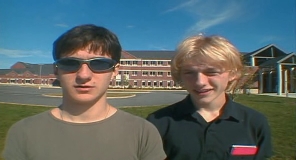 Conceived in the wake of Columbine and completed in 2001, Zero Day sat on a shelf for two years before it saw the light of day. Something happened in the fall of 2001, on some date I can never quite remember, despite the gnawing sensation that we, as a nation, swore never to forget. In any case, The Event (whatever it was) panicked Zero Day‘s distributors into canceling the film’s release. Undeterred, writer/director Ben Coccio used the time to do what all serious creative people do with their stalled projects: tinker. The result gained a limited release in 2003. The fact that I only heard about this film last week should tell you just how “limited.” I like to believe that, even in the midst of 2003’s War Fever, I would’ve noticed a “school shooter” movie opening up down the street. Yet, in the course of researching my next novel (goddamn that feels good to type) I’ve discovered three from that year alone. (Thanks, Variety–you industry rag, you). So here we are, with the first.
Conceived in the wake of Columbine and completed in 2001, Zero Day sat on a shelf for two years before it saw the light of day. Something happened in the fall of 2001, on some date I can never quite remember, despite the gnawing sensation that we, as a nation, swore never to forget. In any case, The Event (whatever it was) panicked Zero Day‘s distributors into canceling the film’s release. Undeterred, writer/director Ben Coccio used the time to do what all serious creative people do with their stalled projects: tinker. The result gained a limited release in 2003. The fact that I only heard about this film last week should tell you just how “limited.” I like to believe that, even in the midst of 2003’s War Fever, I would’ve noticed a “school shooter” movie opening up down the street. Yet, in the course of researching my next novel (goddamn that feels good to type) I’ve discovered three from that year alone. (Thanks, Variety–you industry rag, you). So here we are, with the first.
A pseudo-documentary from the first great post-Blair Witch wave, Zero Day, is another testament to the effective use of limited resources. Like a good insurgency, it turns its weaknesses into strengths, luring the viewer into a subjective, cinematic Venus flytrap with its hyper-realist atmosphere, achieved without professional actors or equipment. Coccio goes so far as to cast real teenagers and their real families, and while I’ll argue that the film is decidedly ambiguous, and take it to task for (I believe the technical term is) “pussying out,” I want to salute the film’s hypnotic effectiveness right off the bat.
There. Done. Now, the summation.
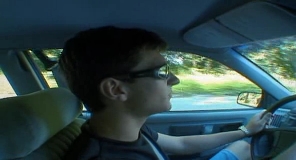 Except there’s little need for a summation. You’ve all heard this before. In broad terms, Zero Day purports to be the last (video) will and testament of two teenage boys: Cal Gabriel (Calvin Robertson) and Andre Kriegman (Andre Keuck). The film follows Our Anti-heroes, who introduce themselves to the camera as “the Army of Two,” through a year of meticulous planning as they prepare to, in Andre’s words, “shoot the school.”
Except there’s little need for a summation. You’ve all heard this before. In broad terms, Zero Day purports to be the last (video) will and testament of two teenage boys: Cal Gabriel (Calvin Robertson) and Andre Kriegman (Andre Keuck). The film follows Our Anti-heroes, who introduce themselves to the camera as “the Army of Two,” through a year of meticulous planning as they prepare to, in Andre’s words, “shoot the school.”
Practically, this amounts to a whole lot of one “Army” member talking to the other, who stands behind the camera, simultaneously participating, directing, and viewing. The whole film is, in effect, a first-person shooter…so much so that at times it threatens to give me an irony embolism. We follow Andre as he showcases the “supply depot” in his closet, which includes fake IDs, waterproof fuses, and Mexican .22 caliber bullets. The boys light 4th of July Fireworks to commemorate their official declaration of war. They egg a hated jock’s house, build pipe bombs in their rooms, chose targets down in the basement, and steal their cousin’s guns.
This is their “series of missions followed by a final, big ass mission,” which they call (shocker) Zero Day. Yet the camera that records their testimonials and short, strategically-written how-to bits also records Andre’s birthday party, the removal of Cal’s braces, a weekend shooting expedition with Andre’s cousin (hell, that’s just about any old Saturday in America’s Mid-wastes), and Cal’s stroll through a graveyard with a reasonably hot chick (Rachel Benichak). Normal, mid-American teenage life…save that Cal and Andre never interact meaningfully with anyone other than each other. Their conversations with parents and peers are superficial at best, stuck in the shadow cast by their plans. Despite the fact neither boy mentions killing people until the thirty minute mark, their action has a specific gravity, warping everything around them, including the film.
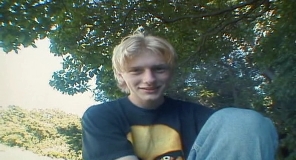 “It’s gonna be unreal,” Cal tells us. “It’s gonna be…beautiful…We’re gonna leave you all behind. Just sticks in the mud that Andre and I create, and we’re gonna walk away. See we, we…we see more than you do.” And so they do. That’s the film’s peculiar misfortune. Ben Coccio’s written (with his brother Christopher) a tight little horror show here, as coldly methodical as its twin protagonists. Its atmosphere of creeping doom might keep you watching, but don’t expect to take anything really substantive away from Zero Day. This film preaches no messages, offers no morals, puts forth no solutions, and is damn skimpy with its reasons. Cal and Andre never pause to justify themselves except in the most abstract terms. “Life isn’t fair,” Andre says, (unconsciously?) echoing his father, “so we gotta even the score a little.”
“It’s gonna be unreal,” Cal tells us. “It’s gonna be…beautiful…We’re gonna leave you all behind. Just sticks in the mud that Andre and I create, and we’re gonna walk away. See we, we…we see more than you do.” And so they do. That’s the film’s peculiar misfortune. Ben Coccio’s written (with his brother Christopher) a tight little horror show here, as coldly methodical as its twin protagonists. Its atmosphere of creeping doom might keep you watching, but don’t expect to take anything really substantive away from Zero Day. This film preaches no messages, offers no morals, puts forth no solutions, and is damn skimpy with its reasons. Cal and Andre never pause to justify themselves except in the most abstract terms. “Life isn’t fair,” Andre says, (unconsciously?) echoing his father, “so we gotta even the score a little.”
This amounts to an abstraction of our protagonists, who remain permanently distanced from us, the audience, despite the fact that the entire movie takes place (more or less) from their perspective. We are within but not of them, and as such, don’t share in their lives any more meaningfully than anyone else in the piece. Frankly, I feel a little cheated. I expected at least one adrenaline-fueled rant against “the world” and the tabloid, zombie robots that inhabit it. So-called “nu-metal” bands have elevated this to a high art, and we prose stylists had better catch up to our more poetic, rock n’ roll siblings before they grind the subject into irrelevancy.
Coccio’s erudite script prepared me for at least some kind of Final Word on the subject. Too bad. There’s no hint of that here, no high horses propping up Zero Day‘s ass. On the DVD commentary, Coccio even says, “Even though I don’t propose any reason why and I am obviously coming from these guys’, these two characters’ perspective, and I am trying to make them watchable, I in no way want to make someone who would do something like this necessarily sympathetic. That’s an impossible task anyway.” Perhaps, Ben. But perhaps you lacked the courage to figure out your main character’s motivations. Fearful of “identifying” or “sympathizing” with your “monsters,” you’ve gone and demonized them, reducing them, and their actions, with your narrative distance. The Army of Two made its choice before the movie even begins. Can we then expect some kind of prequel soon, Ben? Can I call you Ben?
 Ben, you got a great set-up here, but it’s not really a story. By making this a “how done it” you’ve refused to address the (much more interesting for my money) question of “why done it,” depriving me of the opportunity to string you up for your answer’s inadequacies. Instead, I’ll skewer you for your non-answer, which is tantamount to equating school shootings with any other everyday Act of God. Zero Day informs us that we’ll never know the “whethertos and whyfors” of such events, a view with which I (for personal reasons) must take issue.
Ben, you got a great set-up here, but it’s not really a story. By making this a “how done it” you’ve refused to address the (much more interesting for my money) question of “why done it,” depriving me of the opportunity to string you up for your answer’s inadequacies. Instead, I’ll skewer you for your non-answer, which is tantamount to equating school shootings with any other everyday Act of God. Zero Day informs us that we’ll never know the “whethertos and whyfors” of such events, a view with which I (for personal reasons) must take issue.
You see, Ben, these events are not driven by anonymous forces. Scratch the surface of any of them and you’ll find a human being, making a decision conceived in darkness and dedicated to the proposition that all high school students will be equal in death. Cal comes closest to articulating this while discussing the futility of suicide over his sitar. “Why would anyone just kill themselves?” He and Andre see going out with a (literal) bang as the only alternative. “I’m coming out in a black plastic bag.” Baseless at best and self-indulgent at worst, the Army of Two paint a picture of complete hopelessness. For them, staging a massacre-suicide really is the best possible solution. How did they reach this point in their emotional lives? What forces moved within them, as opposed to around them? The question seems too controversial for Coccio in particular, and American filmmakers in general. But I can’t shake the feeling that an answer lies somewhere in that safety deposit box full of tapes the Army of Two sets up for themselves, “so mommy won’t find them under the bed.”
I suppose teenage ennui is as good a motive as any. Fits right in with the adolescent air of the proceedings, along with the boy’s self-conscious militarism. “That’s why we’re the Army of Two,” Andre says, “not the Group of Assholes with Guns.” It would’ve been nice to see some of this army’s propaganda…but, then again, it might’ve been nice to see some footage from an outside source…like the video of Cal’s trip to the Prom, shot from some unknown’s perspective, which inexplicable appears at the hour mark as the film begins to break free of its subjects. What, did someone’s Prom tape get accidentally mixed in with the rest of the Army’s video diary?
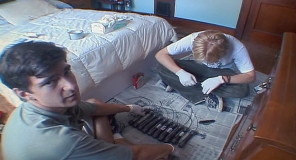 Perhaps a few more “Cal-got-beat-up stories,” (or even one, for that matter) a few more incidents of teenage violence, and a wider exploration of the environment these two boy’s destroy (their school and town, say) would’ve turned this from a merely effective movie into a good movie. Perhaps, hell. It could’ve worked if Coccio had only possessed a bit more balls.
Perhaps a few more “Cal-got-beat-up stories,” (or even one, for that matter) a few more incidents of teenage violence, and a wider exploration of the environment these two boy’s destroy (their school and town, say) would’ve turned this from a merely effective movie into a good movie. Perhaps, hell. It could’ve worked if Coccio had only possessed a bit more balls.
That aside, what am I saying, “merely effective”? Capably acted and well edited by a man who already has more balls than sense, Zero Day is a perfectly made little movie, which deserves more attention that it gets. Awful as in “awe-full” (and not that pejorative “awful” we see so often around here), Zero Day is a real horror show, deserving of the full nine, rabid internet fans and all. Its evil is so banal, its horror so painstakingly ordinary, that it’s final scenes shock not because of their content (we can see that coming) but because of their character. Simultaneously conceived at exactly the wrong and the right time, Zero Day could’ve been a contender, and still can. Assuming anyone else pays it any attention.
![]()
![]()
![]()
![]()
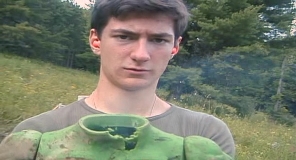

It seemed to present something similar to what the Collumbine (and it’s clearly based on that shooting) killers diaries and video transcripts do of their motives – that’s better than making shit up just so you have a high horse to preach off of, IMO. Dylan wasn’t bullied IRL, so why would Cal be? Eric was superficially bullied, as is Andre, who’s motives I’d love the film to delve into more but it focused on Cal more from what I recall. Why does everyone need some psycho-analytic reason to do things i mean everything has causes, but sometimes they’re hard to understand and stem from how someone else’s brain works. I don’t want to say it’s some internal thing with the killers no one shares, the film seemed very clear on them not being able to do it without one another and was more a character study of their relationship than anything – it emphasized the important point Bang Bang missed (how normal life was for them) . Best of the movies IMO
While I’m here, I’m surprised you didn’t mention how the massacre at the end was portrayed – first time i saw the movie was on youtube, where the scene was pulled, it was a much better movie without it, ending with them walking into the building before the switch to “third person” mode. Since we know what’s going to happen in there and the focus is so on the lives of people who’d do this, it seemed unnecessary.
It’s my favorite of the lot as well…though I’ve yet to find a copy of Uwe Boll’s Heart of America, and there’s always a chance that film might surprise me (though it probably won’t.) Ben Coccio did some of the best character work with a couple of teenagers I’ve ever seen in a long, long time. Yes, it’s a Columbine analog…but, really, they’re all Columbine analogues, befitting the place that school has in our (inter)national imagination. Witness Elephant, Heart of America, or any of these films besides the unfortunate Baskeball Diaries (which doesn’t really belong in the sub-genre). Hell, you can go as far back as Heathers if you like. It’s like Yoda said, “Always two there are.” For one thing, it just makes good dramatic sense, and its surface similarities to the most famous real world inspiration for all these repetitive stories just adds icing on the narrative cake.
Zero Day takes the prize for sheer novelty of form. It’s a definite Blair Witch effect, though I really should’ve compared it to a film Nathan recently reminded me of from early-90s called America’s Deadliest Home Videos. That film also sells itself as the video diary of a survivor/participant in a violent killing spree. It also breaks this conceit near the end, Quantum Leaping away from its main characters to ensure that the last act would be more memorable. That’s the first master Zero Day‘s ending serves: it gives the audience what we’d expect (ending with a not-at-all-proverbial bang). The feeds from the school’s surveillance cameras (a literal view from nowhere) are meant to recall similar shots from April 20, 1999. Cable news ran them (and ran them…and ran them…) so many times that grayed-out images of gun-toting teenagers have become the school-centric rampage’s major aesthetic signifier. It also allows Coccio to escape the confines he set himself, cheating even more than he has already with the Prom scene.
That, to me, felt like the real unnecessary side trip, tacked on there because…well…the film has no idea. It’s just moving its Dylan Klebold-analog through the motions and, since Klebold went to Prom three days before he checked out, here’s Cal, reduced to a non-person amongst the Beautiful People. Its a tension-killer that adds fuck all to the story, other than a Brechtian moment of, “Okay…who the hell’s filming this then.” At least the ending is literally built-up (or counted down to) throughout the entire film, however unnecessary it might be. I’m pretty sure I know why Coccio tacked it on there: he hope it would “please” more people than it annoyed. And, since it “pleased” me (as much as any staged portrayal of human cruelty), I’m inclined to say he was right, since I found it a riveting, affecting, and (in the end) poignantly pathetic…rather like the story behind its real world counterpart.
The third person view, with its low resolution, clinical row of numbers in the bottom of the screen, and its indistinct, cellphone-provided soundtrack, is our director’s way of avoiding that old, idiotic saw about how “you can’t make a real anti-war movie because film can’t help but glorify the spectacular.” Which is bullshit…but from all I’ve read, there was a lot of bullshit clouding ol’ Ben’s thinking during the time he made Zero Day. That’s why we the film can’t bear to get any closer to Andre, or his motivations. That’s why all of Cal’s motivations are obscured behind pseudo-existentialist bullshit. Coccio was literally so afraid of sympathizing with his protagonists…and probably even more afraid of creating protagonists others might sympathize with…that he actually convinced himself making The Army of Two sympathetic was “impossible.”
He chickened out, is what he did. That’s why the film goes out of its way to create so much distance between the viewer and its characters. That’s why snatches of other people’s home movies invade this one. That’s why we switch to a third person, fixed-camera view for the end. That’s why, despite the fact we spend the entire movie with him, we learn fuck all about either of our two protagonists. Coccio went in trying to brand them as The Other, and you could look at the whole film as an attempt, by its main characters, to crawl out from under their creator’s stigma. Or, at the very least, that’s how I’ve viewed it in the past, and it’s been a quite rewarding experience.
I actually saw this during it’s incredibly brief theatrical run. At the time I thought it was the best of the Columbine inspired movies that came out around the same time-head and shoulders over Elephant, but I found the ending frustrating. The use of security camera footage and the 911 call, the stupid use of the joke from Lethal Weapon 2 took me out of the film completely.
I was also curious if the director was trying to imply a homosexual relationship or attraction between the leads, or perhaps just one of them for the other, but at most its implied. I also found the film to be sort of a checklist of “these things didn’t cause this, but I won’t really offer any reason why” and that attitude was frustrating but sort of “eh”.
As far as I’m concerned, it is the best school shooter movie produced to date. I say that having never seen Uwe Boll’s Heart of America but, really…it’s Uwe Boll. A pre-House of the Dead Uwe Boll, no less, so I can only imagine.
The ending did throw me for an unfortunate loop. I sat up and, like you, called the film a cheating bastard, something I don’t dispute at all…but then a horrible thought occurred. If he’d cut to black as the Army of Two entered their school, would we not be sitting around right now, talking about how Our Director cheated us out of the school shooting he spent the whole film building up to? I think the production ran into exactly the mental block I’m butting up against now, wondering how to end on a bang (as it were) without having one of the douche-namic duo carry their precious camera in with them.
Good point. A classic “damned if you do, damned if you don’t” dilemma. I think the great films usually find a way around them, but even in radio shows and print stories that are the last written testimony of a doomed character you get that issue of exactly how they recount the end of the tale and the options generally shake out as a) fade to black, implied doom; b) police reports or more traditional third person recounting of someone finding their materials; or c) straight up cheating. I love The House in Cypress Canyon, for example, but it manages to indulge in all three approaches!
You should be banished for using “nu-metal” and “high art” in the same sentence.
For all I know, I already have been, and it’s why I’m not more popular.